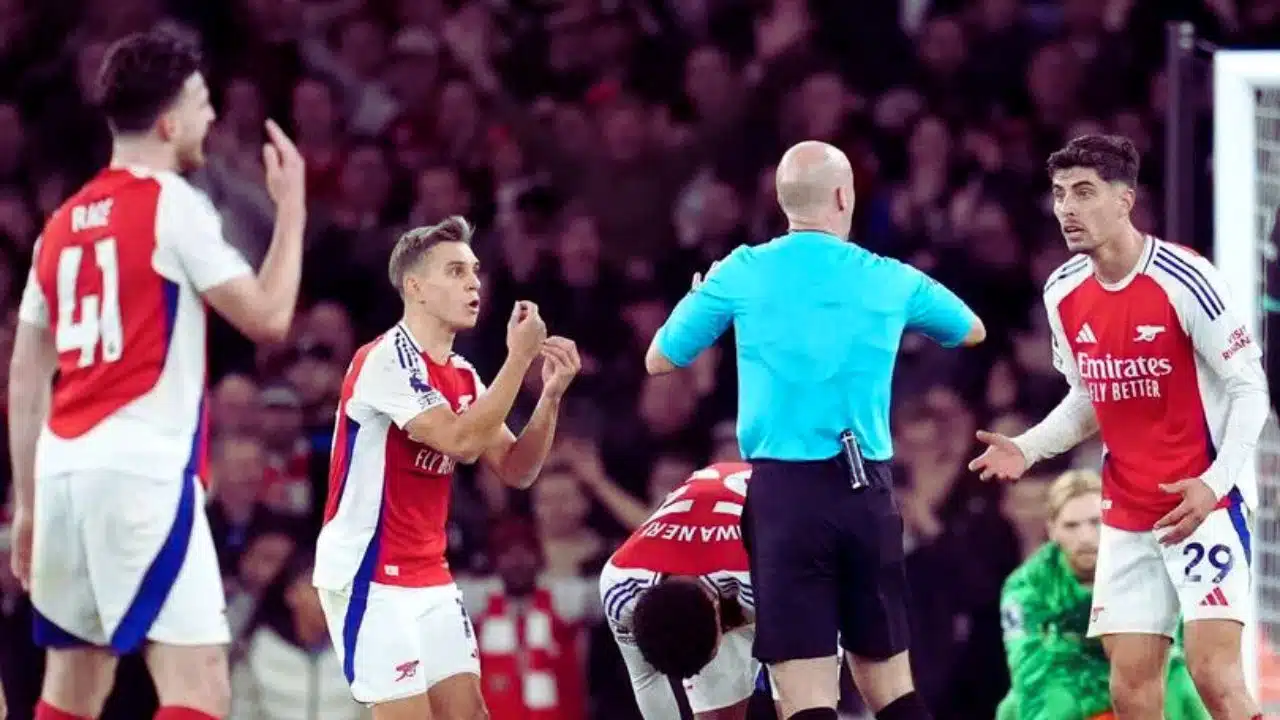For the second consecutive weekend, Arsenal found themselves embroiled in controversy regarding referee decisions that sparked debate and frustration among fans and players alike. After a disappointing 2-0 defeat at Bournemouth, where the controversial sending-off of William Saliba ignited fury among the club’s traveling supporters, Mikel Arteta’s squad faced even more challenges during their high-stakes match against Liverpool at the Emirates Stadium. The weekend was characterized not just by the scoreline but by the critical decisions made by the match officials, which left many questioning the integrity and consistency of officiating in the Premier League.
Key Referee Decisions at Vitality Stadium
During the clash at Bournemouth, referee Rob Jones was at the center of the controversy when he issued a red card to Saliba following a VAR review. The decision to overturn the initial yellow card, which had been issued after a challenge involving the Arsenal defender, was met with considerable outrage from fans who believed the decision was harsh and detrimental to the team’s performance. This incident not only highlighted the emotional investment of supporters but also raised broader questions about the role of VAR in modern football. Fast forward to the Arsenal-Liverpool match, and Anthony Taylor was once again in charge, with tensions running high as both teams were vying for critical points in the title race.
In this thrilling encounter, Arsenal initially took the lead with a well-executed goal from Bukayo Saka, energizing the home crowd and giving the Gunners a much-needed boost. However, the Reds, known for their resilience, fought back on two occasions, ultimately securing a dramatic 2-2 draw. The match featured a wide array of talking points and critical moments, revealing both the highs and lows of the beautiful game. Despite the excitement of a clash between two title contenders, the quality of play dipped at certain points, leading to questions about both teams’ composure under pressure.
Controversial Moments and VAR Checks
As the match unfolded, several controversial moments kept fans on the edge of their seats. Early in the first half, Liverpool’s Virgil van Dijk appeared to kick out at Arsenal’s Kai Havertz, which ignited a brief confrontation between the two players. This incident set the tone for a match filled with physicality and intensity. In addition to the on-field skirmishes, lengthy VAR checks became a recurring theme, much to the annoyance of players and fans alike. A particularly notable incident involved Gabriel Martinelli, who felt he was the victim of a foul as he was caught between the Liverpool defenders Ibrahima Konate and Trent Alexander-Arnold. Despite the clear appeals from Martinelli and the Arsenal players, the Premier League’s Match Centre, which acts as an official communication hub for the league, confirmed that VAR had reviewed the incident and deemed Konate’s challenge to be legitimate, sparking further frustration among the Arsenal squad and their supporters.
With the score tied at 1-1, Arsenal’s hopes were revived when Merino headed in a beautiful cross from Declan Rice, sending the home crowd into a frenzy. However, the joy was tempered by a delay in the confirmation of the goal as VAR conducted an offside review. The Match Centre reported that after thorough examination, the goal was deemed valid, as there were no attacking players in an offside position. This news brought relief to Arsenal fans, though it also highlighted the ongoing debate about the efficiency and timeliness of VAR interventions. Prominent commentator Gary Neville voiced his displeasure during the broadcast, criticizing the pace of VAR officials Michael Salisbury and Darren Cann, suggesting that their slow responses hindered the flow of the match and contributed to mounting tensions.
Late Drama and Confusion
As the match approached its climax, the drama intensified. With only seconds remaining in normal time, Taylor made another controversial decision that infuriated the Arsenal players and the fans alike. The referee blew the whistle prematurely during a promising attacking move that would have led to a potential game-winning goal from Gabriel Jesus. The Brazilian striker had been perfectly positioned to tap in what could have been the decisive goal after a deflected shot from Kai Havertz hit the post. The confusion deepened as it became clear that Taylor had ruled a foul against Jakub Kiwior for his challenge on Liverpool’s Dominik Szoboszlai, even though Szoboszlai had not been actively contesting for the ball. Taylor’s decision to stop play meant that VAR could not intervene to review the foul, leaving players and fans bewildered and disappointed. After the match, Arteta expressed his frustration over the lack of clarity regarding the foul call, stating, “I’m sure we’ll get a letter afterwards, but I don’t know,” indicating a desire for better communication and transparency from the officials.
Expert Opinions on Referee Performance
The weekend’s officiating came under scrutiny from various quarters, including former Premier League referee Mike Dean, who offered his perspective on the contentious decisions. Dean described Kiwior’s foul as “more of a soft foul,” suggesting it was a 50-50 call that could have gone either way. He acknowledged that while the refereeing crew had largely performed well throughout the match, this particular decision could certainly be the subject of discussion and debate among fans and analysts alike. Dean’s comments reflect the broader sentiment that while officials must make quick decisions in high-pressure situations, the subjective nature of some calls can lead to significant controversy and dissatisfaction among players and supporters.
The Ongoing Debate Surrounding VAR
The events of the weekend highlight a growing concern surrounding the effectiveness of VAR and the consistency of refereeing decisions in the Premier League. As Arsenal continues to grapple with these contentious moments, the club’s supporters are left questioning whether the current officiating standards can truly reflect the intensity and passion of top-flight football. With the Premier League title race heating up, every point becomes crucial, and the impact of officiating errors can be felt far beyond just a single match. The frustrations experienced by Arsenal players, management, and fans alike underscore the urgent need for ongoing discussions about how to improve the officiating process and enhance the overall experience for everyone involved in the beautiful game.
As Arsenal prepares for their upcoming fixtures, the echoes of this weekend’s events will likely linger, fueling debates not only about the refereeing decisions but also about the broader implications for the team as they strive for success in a highly competitive league.
The information is collected from ESPN and Yahoo.





































